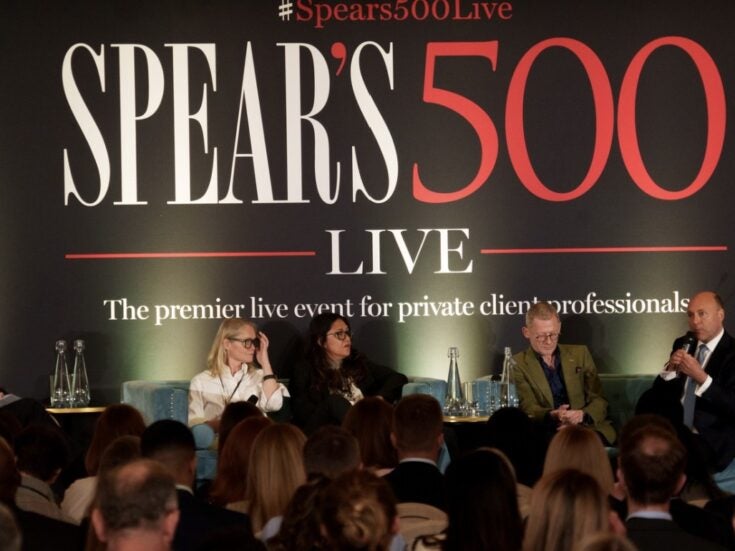
HNWs and their representatives gathered at Brown’s for the latest Spear’s breakfast briefing held in association with eToro
More than 40 HNWs gathered at Brown’s in central London for the latest Spear’s breakfast briefing, held in conjunction with eToro, one of the world’s biggest cryptocurrency trading platforms with over 10 million users in 140 countries.
‘Is cryptocurrency too volatile to be considered an investable asset?’ was the question under discussion; the objective, to educate HNW attendees on cryptocurrency. It turned out to be an energetic discussion, with more sceptical figures in the industry ranged against those bullish on cryptos.
The panel included Alan Miller, the founding partner and CIO of SCM Direct; Petronella West, the director of private clients at Investment Quorum; Mark Ward, the head of execution trading at Sanlam Securities UK; and Iqbal Gandham, chair of the self regulatory trade body CryptoUK and the managing director of eToro UK. It was chaired by Christopher Jackson, deputy editor of Spear’s.
HNWs in attendance included Kojo Annan, the UHNW tech entrepreneur, Nataša Williams, head of private office and partner at LGT Vestra; Paul Munford, the CEO of Century Capital; and Robert Olsen, the COO of Radix. As a result both on the panel and in the audience, there was an eclectic range of views on the hot topic of the moment.

Albert Einstein said you don’t understand something until you can explain it to your grandmother: so our panel began by arriving at a definition of cryptocurrency. Ward said: ‘When you’re buying a cryptocurrency you’re effectively buying a very complex algorithm and a peer-to-peer network. It’s a digital asset. It’s not backed by anything.’ ‘Just like the pound,’ said an audience member, setting the tone for a lively discussion.
‘For me it’s just an evolution of money,’ explained Iqbal Gandham, from eToro. ‘A few hundred years ago we dug money out of the ground, then we started using printers. Whereas banks used to secure funds, now we use cryptography.’

Alan Miller explained his scepticism. ‘I remember years ago I saw a company that was leasing containers,’ he recalled. ‘We met the management, we were impressed – but we could never explain it. Years later it turned out to be scam and the whole thing went spectacularly bust.’ For Miller, blockchain is analogous: ‘Everybody talks about cutting out the banks, but there’s still a bank on the end, you still have to convert it from old-fashioned cash into bitcoin at the other end.’ ‘For now,’ said another audience member.
A gulf in opinion was already in evidence. But Gandham observed that these sorts of polarisations accompany every new discovery: ‘I’m sure they had some interesting conversations in the Post Office when email was developed,’ he joked.

Petronella West, however, also remained sceptical. ‘My job is not to lose money,’ West said, though she noted that one very sophisticated client of hers with a PhD in physics has expressed an interest. ‘But in terms of my role for clients, it’s too esoteric and complicated,’ she said.
Now it was Gandham’s turn to address the volatility question: he observed that the stock market is also volatile, and that the early volatility of internet stocks was shouldered by a relatively small number of investors into companies like Myspace and Facebook. ‘The question is: “Are we prepared to invest in technologies at an early stage?”’ he asked.

Miller was unconvinced: ‘The volatility of the dollar or the euro compared with bitcoin is minimal,’ he said. ‘Bitcoin is ten times more volatile.’ Ward agreed: ‘Stock markets don’t act like a bitcoin. You won’t get your account hacked at JP Morgan. [With Bitcoin] you’ve got the illiquidity, volatility, fraud, bubble characteristics, and lack of understanding.’
That was a cue for Gandham to comment that there are numerous users on the blockchain – and indeed numerous blockchains. Things were only getting livelier: it seemed a kind of epochal clash between the traditional and the new; or the sensible and the credulous, if you prefer.
However, there is evidence of cryptocurrency moving towards the mainstream. Gandham explained that he is soon to give oral evidence to the Treasury Select Committee. ‘Regulation is coming,’ he said, simply, before adding: ‘From an investment perspective, if you had the opportunity to go back to 1994 and you had the chance to invest a part of your portfolio in http, would you deny that to your clients?’
‘If time travel were allowed we’d all be incredibly wealthy,’ chimed in Nataša Williams from the audience, to widespread amusement.
West said: ‘The regulatory aspect is huge for me as I’m FCA-regulated. We don’t measure by return: we’re not trying to shoot the lights out.’
Miller also remained sceptical: ‘When people say, “this is new” or “this is the game-changer”, it’s normally disastrous. I’m not saying everything is disastrous: but tell me what the price will be in three years and how you came to that price?’

Gandham remained impressive throughout, and frequently educated the audience with an infectious enthusiasm: ‘The technology is evolving — I feel we’re having conversations which are two-years-old.’ But will bitcoin win the race among cryptocurrencies? ‘Brand is a big thing,’ he said. ‘If you go to any man on the street and say cryptocurrency, they say bitcoin.’
He added: ‘We’re bogged down with the problems. For some reason, we keep saying, “We can’t scale”’. But for Gandham it’s scalable – and even more, it is inevitable that the technology will scale soon.
This was a fascinating conversation, which moved swiftly, with an admirable passion for innovation exhibited on the one side, and a perhaps equally admirable client-conscious caution on the other. All that was certain was that this is a topic of unusual interest – the audience afterwards chatted excitedly chatting about what they’d heard as they dispersed.






